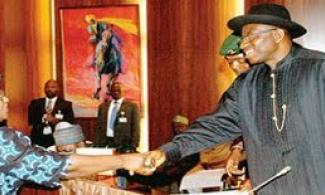
President Goodluck Jonathan's financial recklessness has further depleted the strategic foreign reserve of the Nigerian state by $3.5 billion in 2011 alone, according to information obtained by SaharaReporters.
President Goodluck Jonathan's financial recklessness has further depleted the strategic foreign reserve of the Nigerian state by $3.5 billion in 2011 alone, according to information obtained by SaharaReporters.
googletag.cmd.push(function() { googletag.display('content1'); });
A source at the ministry of finance told SaharaReporters at the weekend that when Mr. Jonathan came into office, he met a robust foreign reserve in place, but this year alone, he and his gluttonous inner circle have frittered away $3 billion of the reserves, which is now at $32 billion, down from $35 billion in January.
This situation is further compounded by criminal rent seeking and petroleum subsidy applied to petroleum products importers, notably Femi Otedola, who are also members of Jonathan's "Economic Team." In 2011, rent seekers and economic leeches will get $6 billion in the name of petroleum subsidy.
A Central Bank of Nigeria document however states that so far petroleum product importers have only imported $7 billion worth of fuel imports, meaning that only $1 billion of their investment has been spent on import, with Nigeria being made to subsidize and reward their criminal activities with $6 billion.
SaharaReporters also learnt that foreign multinational oil companies are ripping Nigeria off through a maze of sharing and royalty agreements that were agreed upon in the 90s when oil prices were at $30 per barrel. Last week, following an extraordinary meeting of the Central Bank of Nigeria’s Monetary Policy Committee (MPC) on October 10, the CBN revealed in a communiqué that a substantial part of oil production (about 40%) is currently in deep offshore wells.
“Based on terms agreed in the 1990s when oil price was under $30, royalty from oil wells deeper than 1,000 metros is zero percent and the nation is maidenly 20 %of profit by oil companies after deducting their expenses, as a result the country (Nigeria) has had limited benefit from high polio prices and increasing output, with most of the gains going to multinational oil companies under and inequitable fiscal arrangement," the MPC said.
Whereas the MPC recommended the passing of the Petroleum Industry Bill (PIB) to stop the scams in that industry, it however recommended that Nigerians be saddled with the burden of paying for the crimes of the rent seekers involved in petroleum subsidy scams and blamed “discordant voices” for delaying “enabling legislation for correcting fiscal terms.” The committee asked that Nigerians be made to pay higher prices for petroleum products that would put some $10 billion back into the economy.
“Whereas the labour unions have genuine concerns about the impact of subsidy removal on the poorer segments of society, the stark reality is that the country is living above its means,” the MPC said.
The MPC estimates that “simply passing the PIB and removing subsidies on Premium Motor Spirit(PMS) will add at least $10 billion to national reserves annually,” with no consideration of how quickly irresponsible governing vultures will descend on it at the expense of the nation’s poor on whose back such numbers will be made up.
googletag.cmd.push(function() { googletag.display('comments'); });
googletag.cmd.push(function() { googletag.display('content2'); });